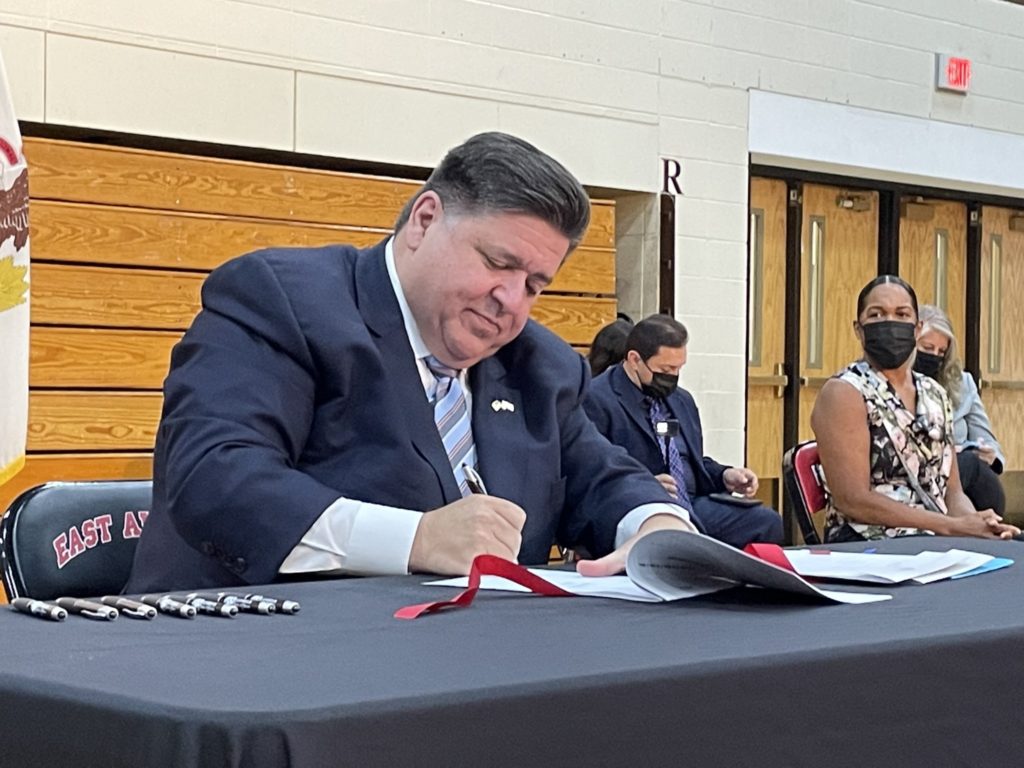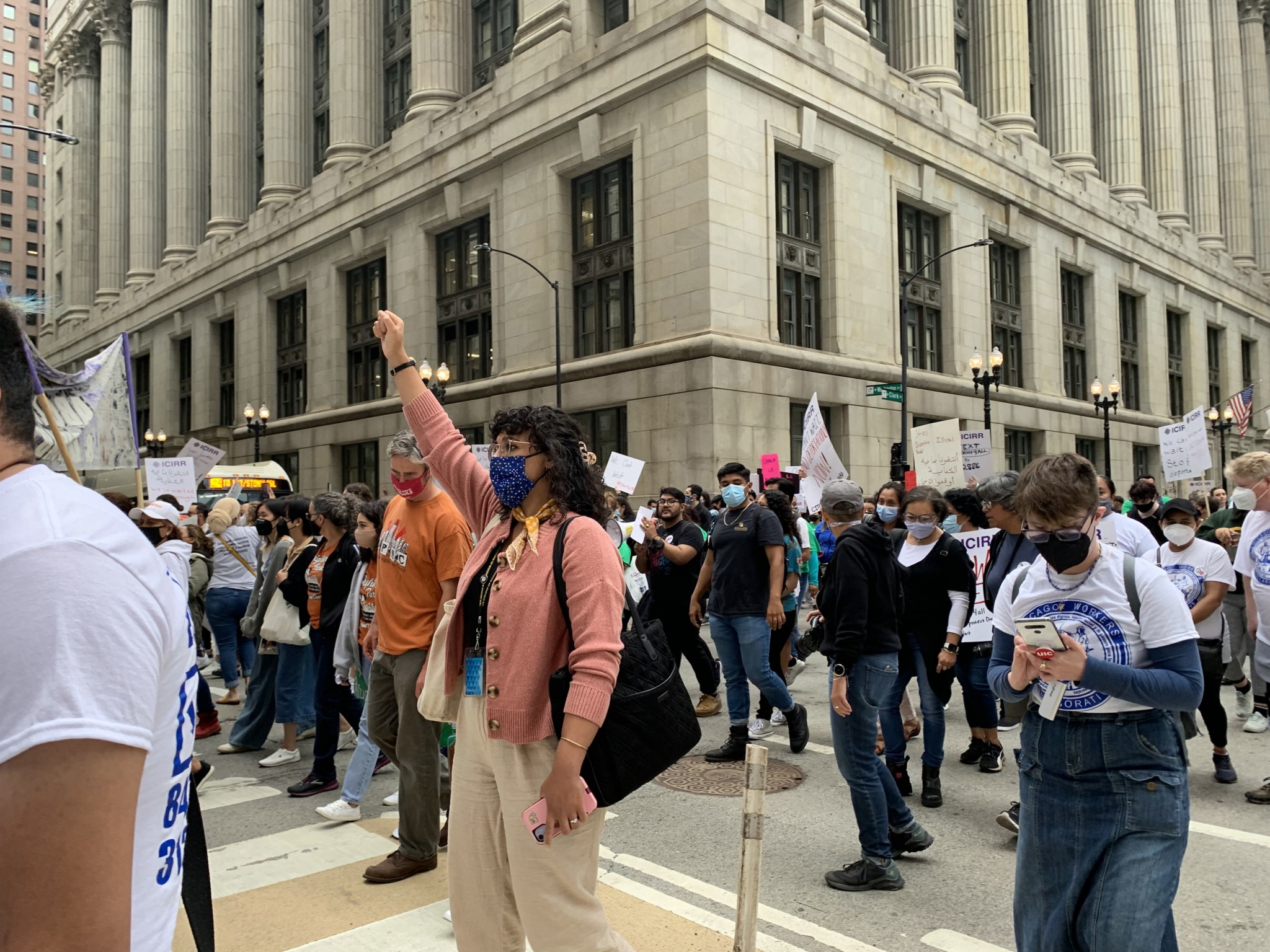Gov. J.B. Pritzker signed the Illinois Way Forward Act on August 2, dramatically restricting the way local law enforcement will be able to cooperate with U.S. Immigration and Customs Enforcement (ICE) in Illinois.
“The Illinois Way Forward Act strengthens the TRUST Act by taking immigration status off the table in all state procedures where it has no relevance, putting greater teeth into those protections through the attorney general’s office and making Illinois the second state in the nation to require all local officials to end partnerships with ICE by the end of this year,” Pritzker said during Monday’s press conference at East Aurora High School.

Upon signage, ICE will no longer be able to use local jails or hold contracts with detention centers in Illinois, law enforcement will not be able to give them information about custody status or release dates for those with immigration charges, and police will not be able to transfer anyone into ICE custody.
But despite the bill’s embrace by immigration advocacy groups and progressive lawmakers, questions remain about the presence ICE will continue to have in the state and what will happen to the estimated 260 individuals currently detained at the three facilities in Illinois that have agreements with ICE.
The three county jails in Illinois with which ICE holds contracts—Jerome Combs Detention Center in Kankakee, the McHenry County Jail, and the Pulaski County Detention Center—will be required to terminate their agreements before January 1, 2022. Once their contracts are cancelled, McHenry and Kankakee will have 30 days to close their immigration detention facilities, while Pulaski will have 120 days, according to Fred Tsao, senior policy counsel at ICIRR.
Nationally, ICE relies heavily on partnerships with local law enforcement to carry out immigration operations, make arrests, facilitate transfers, and make use of detention space. With this bill, anyone arrested and detained by ICE in Illinois will have to be transferred to an out-of-state facility, according to advocates. County jails and local law enforcement will also be barred from entering into new agreements with ICE for immigration detention purposes in the state of Illinois.
“One piece of the deportation pipeline will be closed off,” said Tsao. “People in immigrant communities, their family members and their neighbors should have some greater assurance that they can turn to police or other law enforcement without being questioned about their status,” Tsao explained.
But he said it is still unclear how ICE will adapt to not having jails to hold people for immigration detention in the state. “ICE already uses several other jails outside Illinois (in Wisconsin, Indiana, and Kentucky) for detention in its Chicago region, so it’s likely that ICE will put those facilities to greater use,” he wrote in an email.
Tsao said his organization hopes ICE will release some of the current detainees instead of transferring them all to other facilities with which the agency continues to hold contracts. “What we do not want them to do is to merely transfer people out of Illinois to other jails, whether that’s in the Chicago region or far beyond the Chicago region,” he said.
HAPPENING NOW: Illinois Way Forward Bill Signing https://t.co/sZ5nt8Um5a
— IL Immigrant Rights (@icirr) August 2, 2021
Additionally ICE, which operates independently of state laws, will still be able to arrest, detain and deport people in Illinois—they will just have to do so without the assistance of local authorities.
The majority of ICE detainees are not held in facilities directly owned and operated by ICE, but instead are housed in local and privately owned facilities. ICE utilizes different types of contracts with facilities and local governments in order to do this. One type of partnership, called an Intergovernmental Service Agreement (IGSA), is a direct contract between a local jail and ICE; the agreements, signed by both parties, can be initiated by ICE or the county jail.
ICE utilizes contracts with county jails, detention centers and private facilities to detain individuals for immigration-related offenses or to hold them during deportation proceedings. As of July 6 2021, ICE had agreements with 203 different facilities across the United States. Forty-two of them are in the Midwest, according to a list of facilities maintained by ICE’s Enforcement and Removal Operations (ERO) Custody Management Division.
In Kankakee and McHenry, ICE uses a “rider” on the facilities’ existing detention contracts with the U.S. Marshal’s Service, allowing ICE to bypass entering into their own contract with a local jail or detention center. The Illinois Way Forward Act includes language intentionally directed at ending all types of contracts ICE may use, according to Mark Fleming, associate director of litigation at the National Immigrant Justice Center in Chicago. “It’s drafted in a way to make sure that no matter what nomenclature [ICE] is using for what the contract is, that this captures it,” Fleming said. “It requires [detention centers] to terminate any portion of the contract that is used to house or detain people on civil immigration violations.”
Fleming also said that it is possible Kankakee and McHenry counties may try to sue the state over this bill or try to claim that it does not apply to their contracts with ICE.
COVID-19 has decreased the number of people detained in ICE detention centers. But since President Joe Biden took office at the end of January, the number of people in ICE detention across the U.S. has doubled—from 13,529 in February to 27,670 as of July 23, according to the USCIS website. According to data from Syracuse’s Transactional Records Access Clearinghouse (TRAC), 79.4% of current ICE immigrant detainees have no criminal record.
ICE declined to comment on the Illinois Way Forward Act but did provide information about what typically happens when they make custody determinations. According to an ICE spokesperson, cases are reviewed on an individual basis and take into account someone’s criminal background, immigration history, ties to the community, risk of flight and whether they pose a safety risk.
They added that ICE considers a detainee’s support network and community when making decisions about where to transfer them, in an effort to keep them close to family members or legal services. If McHenry, Kankakee and Pulaski terminate their ICE contracts, detainees will either be released or transferred—a decision that is made by ICE, according to immigration policy experts.
Tsao said that it is encouraging to hear that ICE intends to review detainees’ cases. But he worries, citing at least two recent examples of detention centers in other states that—after expressing a desire to terminate their ICE contracts—transferred their detainees to other facilities, some in other states, according to local news outlets.
For example, after celebrating the anticipated termination of ICE detention contracts in New Jersey and Pennsylvania, advocates were disappointed to learn that detainees were transferred rather than released. The American Civil Liberties Union (ACLU) filed a lawsuit against the Biden administration in June over the detainee transfers in Essex County, New Jersey, alleging they would be transferred as far away as Alabama, Georgia and Louisiana. At least forty-six detainees have been transferred from Essex County to unknown locations, a county official told NJ Spotlight News.
“Transferring hundreds of people far away from their families and attorneys violates the rights and dignity of New Jerseyans, and we’re calling on the courts to stop this policy of gratuitous cruelty,” ACLU-NJ Executive Director Amol Sinha said in a press release.
ICIRR will continue to push for the release, rather than transfer, of individuals detained for immigration offenses in Illinois, Tsao said. He also warned that even when the Illinois Way Forward Act passes, immigrant communities and their families should continue to be “on guard.”
Bárbara Suarez Galeano from Organized Communities Against Deportations (OCAD), a Chicago-based organization working to end the criminalization and incarceration of undocumented individuals, agreed that although the bill is a step forward, it will not completely stop deportations in Illinois. “We know that nothing’s going to completely take away the constant threat of violence and abuse that the presence of ICE in our communities, as well as the presence of police represent,” she said. “Many times, things sound great on paper.”
Suarez Galeano stressed that detention centers are just one way that the U.S. incarcerates people of color. Continued surveillance and electronic monitoring—alternative options for detainees released from ICE detention centers—are not what their organization hopes to see. “It’s a big reason why we still need to keep pushing to defund these institutions, because they’ll always rethink ways to use those funds to target us,” she said.
ICIRR, OCAD and other local organizations created the Family Support Network (FSN) to help undocumented communities fight back against deportations through legal services, know-your-rights workshops and political action. They also maintain a family support hotline offered in Korean, Spanish, English and Polish, which can be reached at +1 (855)-HELP-MY-FAMILY, (1-855-435-7693).
Now, advocates and lawmakers are pushing for legislation similar to the Illinois Way Forward Act in other states and at the federal level, in an effort to provide greater protections for immigrants across the country. U.S. Rep. Jesús “Chuy” García (D-IL), who attended the press conference, introduced the New Way Forward Act in January with the support of 41 congressional Democrats.
If passed, a federal bill would begin to dismantle the system of laws that criminalizes and penalizes immigrants. Among its reforms, it would ban cooperation between local law enforcement and federal immigration agents not just on the state level, but nationwide.
?Great day for immigrant communities in Illinois! Today, @GovPritzker signed legislation that makes IL a model for our nation on how to protect and defend immigrant and mixed-status families. #HereToStay pic.twitter.com/rEntTNNOwA
— Congressman Chuy García (@RepChuyGarcia) August 2, 2021
Madison Muller recently completed her master’s degree at the Medill School of Journalism and is now a Barbara M. Reiss Fellow for the Medill Investigative Lab and The Washington Post. She last reported on the Palestinian march downtown Chicago in May 2021.

